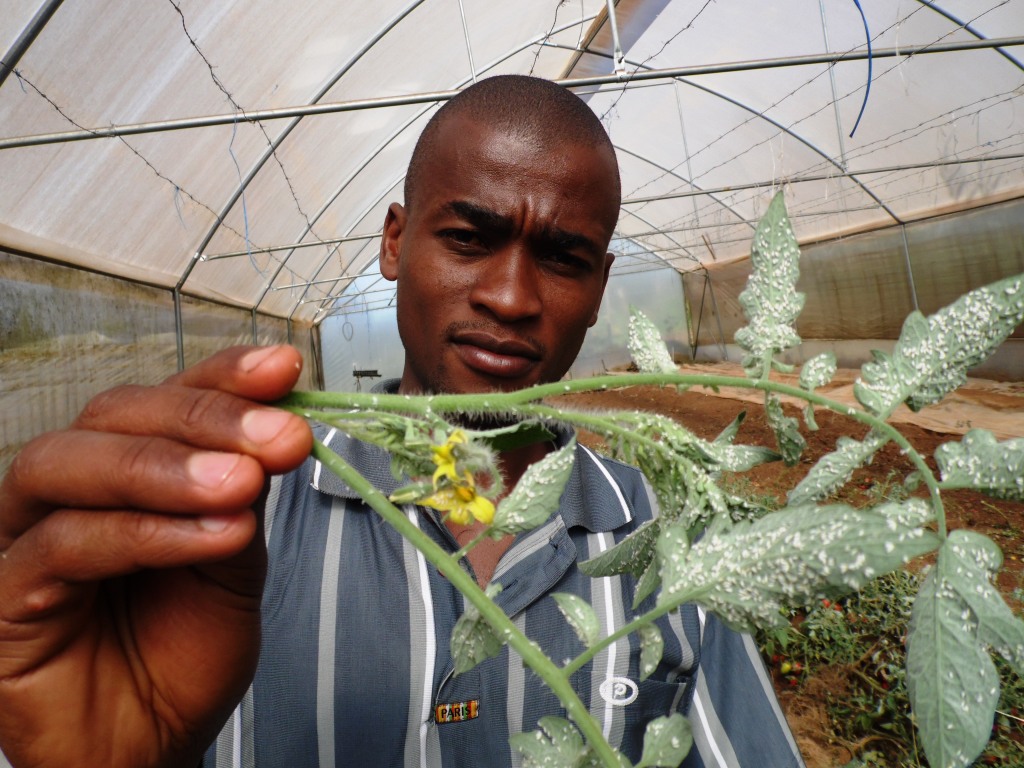In cutting down pesticide application and the accruing costs in production, one farmer succeeded in vending off the pests by growing onions around his greenhouse tomatoes in the last season.
Lari Sub-county farmer Nathan Kimeu was implementing an idea he learnt from the Internet that onions’ smell can repel some crop pests like aphids.
“I found out that some crops are good biological controls of pests, which attack common commercial foods such as chillies, capsicum, Kales, cabbage, tomatoes, among others. I also leant that greenhouse rotation with non-victim crops like coriander can break the lifecycle of the enemies,” he said.
When he grew onions in the periphery of his 8m by 30m greenhouse, which had tomatoes as the main crop.
Indeed on close scrutiny of the tomatoes on the outermost lanes- those neighbouring the onion soldiers- were free from the aphid attack for the entire season.
Aphids are pest that drill into the leaves of crops. They suck the sap with the nutrients, causing severe produce losses due to unhealthy crops.
The leaves curl to the because of the heavy infestation from the underside. This condition reduces the surface area for photosynthesis, the food making process in plants.
Because of the extraction of the nutrient-rich sap, some leaves turn yellow due to malnourishment, which also reduces photosynthesis resulting from the absence of the green pigment.
This negatively affects the overall production.
Application of chemicals in the control of the pests is not only expensive as is required interval interventions. But the onions are a one-time cost that defends the crop until the end of the season and still be sold alongside the main crop, Kimeu said.
“Organic farming is gaining fame as food-related diseases rise. I am starting small and with such positive results, I hope to go organic to meet the small but healthy eating market,” he said.
The Kiambu County farmer intends to grow the ‘soldiers’ along the rows of the tomatoes to boost the defence while reducing the cost of production.
Although he cannot quantify the money saved from the biological control of the pests, the farmer says his main pesticides application was specific on other pest such as white flies and mites.
READ ALSO:Tomato farmer lights lantern at night to trap more fruit flies
READ ALSO: Yellow staking strings attract tomato pests, expert warns farmers
READ ALSO: New disease tolerant tomato can earn over Sh2million in 75 days
The tomatoes, however, never performed well towards the peak of harvesting despite reduced attack from the pests.
Kimeu attributes the decline to the overgrowth of the roots in the bags, which he says, hindered uptke of water and nutrients. The multiplying roosts were scorched by the polythene bag, despite application of water because of the high temperatures during the dry spell.
The crop protection programmes started from seedlings age. He grew the seedling in a soilless media which helped in controlling other pests like nematodes.
This also gave a strong vigour in growth of the tomatoes since there was minimum disturbance of the rots during transplanting.
He also steamed the soil to kill disease causing pathogens like nematodes.
“I expected to harvest at least 30 crates of 32kg per week for eight months. But it never happened. The loss is a gain for me; I have learnt how to do it better in the next season,” Kimeu said.
Common crop pests such as mites, leaf miners, aphids, white flies, among others do not attack coriander. This makes it one of the best rotational crops after harvesting the susceptible varieties. Growing the coriander in a greenhouse breaks the lifecycle of such pests, therefore reducing their population ahead of the next susceptible crop.

















Comments powered by CComment